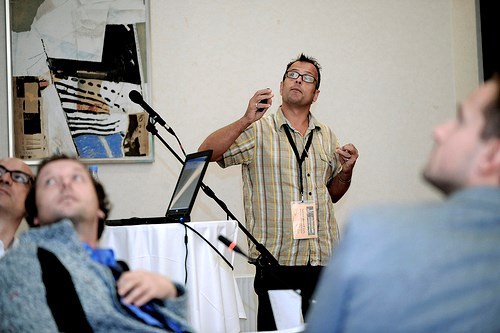Social Media – the realm of ghost agents

Steve Menary talks about Facebook's fake football agents at Play the Game 2013. Photo: Play the Game / Thomas Søndergaard
04.11.2013
By Marcus HoySteve Menary, a freelance journalist and lecturer at Southampton’s Solent University, told Play the Game participants that young, impressionable football players in developing nations were being targeted by fraudsters claiming to be registered FIFA agents.
Often, he said, the first contact is made with the players via Facebook, which in practice allows anyone to set up an account under an assumed name. One such victim was footballer Vurlon Mills, Menary said, a successful striker on the Guyanan national team who did not have a professional club contract. He was approached via Facebook by a person claiming to be the Navarro Aparicio, who was listed on the FIFA website as an agent registered with the Spanish Football Association.
Mills was informed by the agent that he had been offered a trial with English club Bristol City. However, he was first required to wire 500 GBP to a Western Union agent in Germany to cover his health insurance. As the agent appeared legitimate, Mills borrowed the money and wired it to the address provided.
Alarm bells began ringing when he was advised that another GBP 1200 would be needed to cover additional costs. His attempts to cancel the arrangement and retrieve his original investment went unheeded. When contacted by Menary, Bristol City said that it was regularly contacted by players and agents regarding scammers offering fake trials.
Mills, who subsequently was awarded a professional club contract in Trinidad and Tobago, told Menary that the public list of national agents on the FIFA website was open to abuse as often only the agents’ names are disclosed.
Scammers could easily set up a fake social media account purporting to belong to a real agent, he said, together with a false email address. FIFA.com confirms that the agent’s name is correct, which does no harm to the scam.
According to FIFA, the provision of agents’ contact details is the responsibility of national football associations. However, to prevent this growing scam, Menary said, FIFA should insist that agents’ contact details including full business address, telephone number, and email should be published as a matter of routine.
Social media determines the agenda
Thomas Horky, a Professor at Germany's Macromedia University of Applied Sciences, pointed out that social media was increasingly defining the subject of debate.
While mass media doesn’t tell us what to think, he said, it often determines the agenda, and this trend will increase in the future.
However, he added that sport’s major governing bodies still had little social media interaction with the general public. The IOC’s Facebook page was little different to a PR website, he said. Athletes were also increasingly using social media to attract coverage from traditional media, he added, citing as an example their ability to post photos from places where “no sports photographer can go”.
Joerg Uwe-Nieland, a Lecturer at Cologne’s German Sport University Cologne, put the spotlight on the phenomenon of spornification, or the display of erotic images of sportsmen and women in the media. The so-called “Kournikova syndrome” could have negative impacts in relation to role models and, potentially, fan behavior, he said.
Read more about Steve Menary’s investigation at http://www.worldsoccer.com/columnists/aspiring-players-being-conned-by-fake-agents-special-report-by-steve-menary#r6lz67GdCCBjj40S.99





